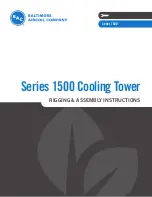
349215-JIM-B-1008
Johnson Controls Unitary Products
51
Gas flows into each of the main burners and is ignited
from the carryover tube flame.
After completing the specified fan on delay for heating,
the UCB will energize the blower motor.
If "IC1" fails to detect a pilot flame, it will continue to try
for a maximum of 85 seconds to ignite the pilot tube. If
the pilot flame is not detected, then "IC1" will lock out
first stage furnace operation for five minutes or until
24V power is removed from the module either at the
unit or by resetting the room thermostat.
When the thermostat calls for the second stage of
heating, the low-voltage control circuit from "R" to "W2"
is completed, thru the UCB. Heat relay "RW2" is ener-
gized. The "RW2-1" contact is closed energizing the
second stage ignition module "IC2". "IC2" will immedi-
ately start the second stage igniter sparking and will
open the redundant valve located inside the second
stage main gas valve "GV2" to allow a flow of gas to
the second stage carryover tube. Only after the pilot
flame has been ignited and the presence of pilot flame
detected at "IC2" by a signal sent back through the
flame sensor is sparking terminated and the main gas
valve opened.
Gas flows into each of the second stage main burners
and is ignited from the carryover tube flame.
If "IC2" fails to detect a pilot flame, it will continue to try
for a maximum of 85 seconds to ignite the pilot tube. If
the pilot flame is not detected, then "IC2" will lock out
first stage furnace operation for five minutes or until
24V power is removed from the module either at the
unit or by resetting the room thermostat.
NOTE:
That the second stage furnace can operate
even if first stage has locked out.
When the thermostat satisfies de-energizing the
"RW2"and "RW1", thus opening all gas valves. The
blower motor will continue to run after the furnace is
shut down until the specified fan off delay for heating
has been satisfied. The UCB will de-energize the
blower motor.
When the thermostat calls for the first stage of heating,
the low-voltage control circuit from "R" to "W1" is com-
pleted. A call for heat passes through the UCB to the
ignition control board (ICB). The UCB monitors the
"W1" call and acts upon any call for heat. Once voltage
has been sensed at “W1”, the UCB will initiate the fan
on delay for heating, energizing the indoor blower after
the specified delay has elapsed.
When the thermostat has been satisfied, heating calls
are ceased. The GV is immediately de-energized. The
blower is de-energized after the fan off delay for heat-
ing has elapsed. The draft motor performs a 25-second
post purge.
GAS HEATING OPERATION ERRORS
TEMPERATURE LIMIT
If the UCB senses zero volts from the high temperature
limit, the indoor blower motor is immediately energized.
When the UCB again senses 24 volts from the temper-
ature limit, the draft motor will perform a 25-second
post-purge and the indoor blower will be de-energized
following the elapse of the fan off delay for heating.
This limit is monitored regardless of unit operation sta-
tus, i.e. the limit is monitored at all times.
If the temperature limit opens three times within one
hour, it will lock-on the indoor blower motor and a flash
code is initiated (See Table 27).
GAS VALVE
The UCB continuously monitors the GV. Any time the
UCB senses voltage at the GV without a call for heat
for a continuous five-minute period, the UCB will lock-
on the indoor blower and a flash code is initiated
(Table 27). When voltage is no longer sensed at the
GV, the UCB will de-energize the indoor blower follow-
ing the elapse of the fan off delay for heating.
If voltage has been sensed at the GV for at least 15
seconds during the fan on delay for heating and GV
voltage or "W1" is lost, the indoor blower is forced on
for the length of the fan off delay for heating.
FIGURE 23 - GAS VALVE PIPING
GAS
VALVE
GAS MAIN
MAIN VALVE
TO MAIN
BURNER
REDUNDANT
VALVE
TO PILOT BURNER
















































